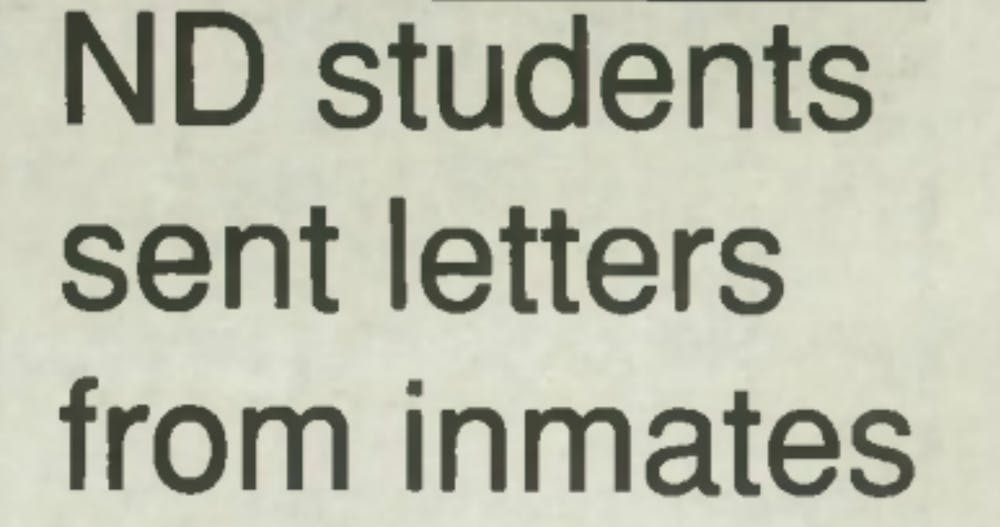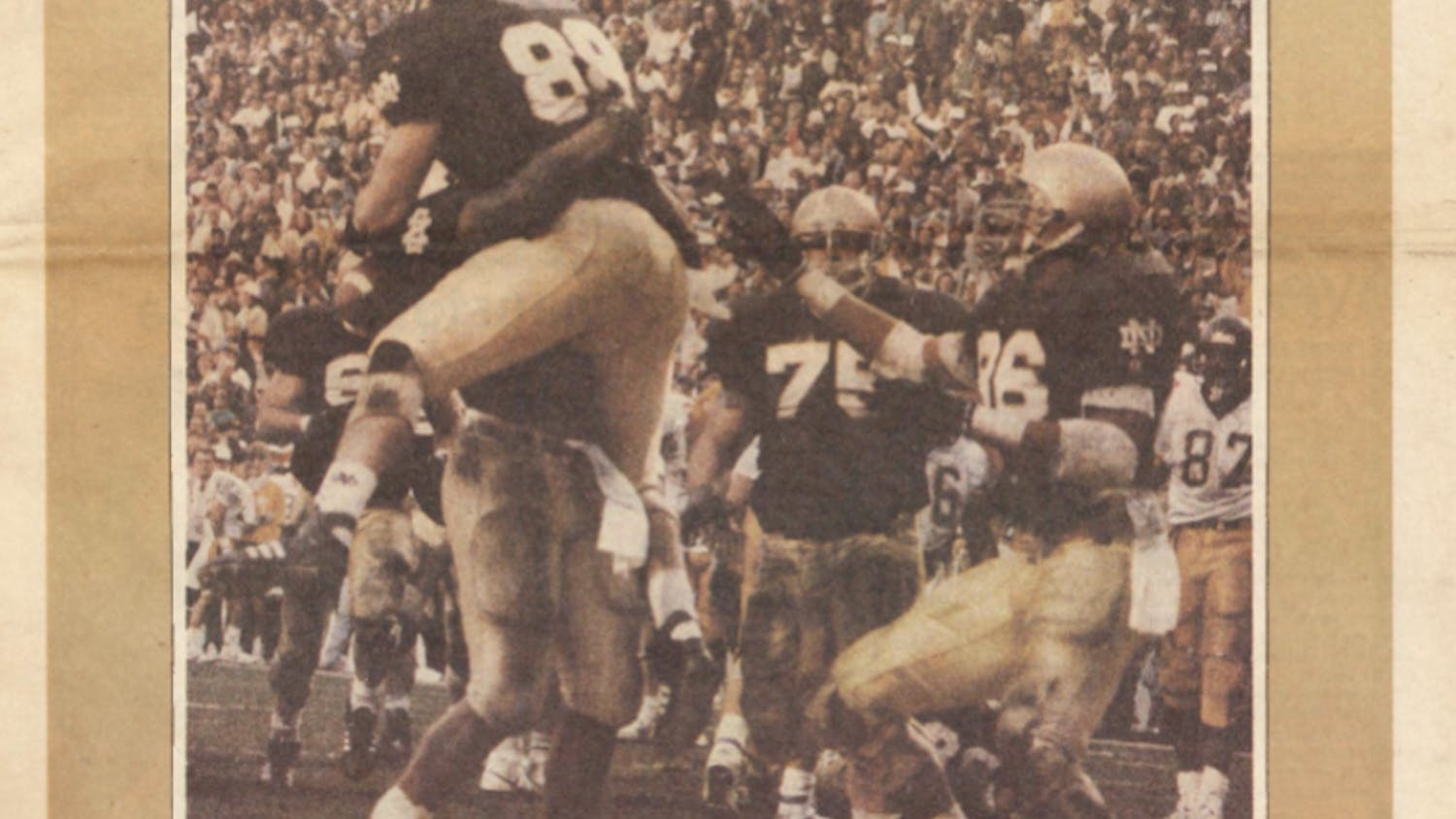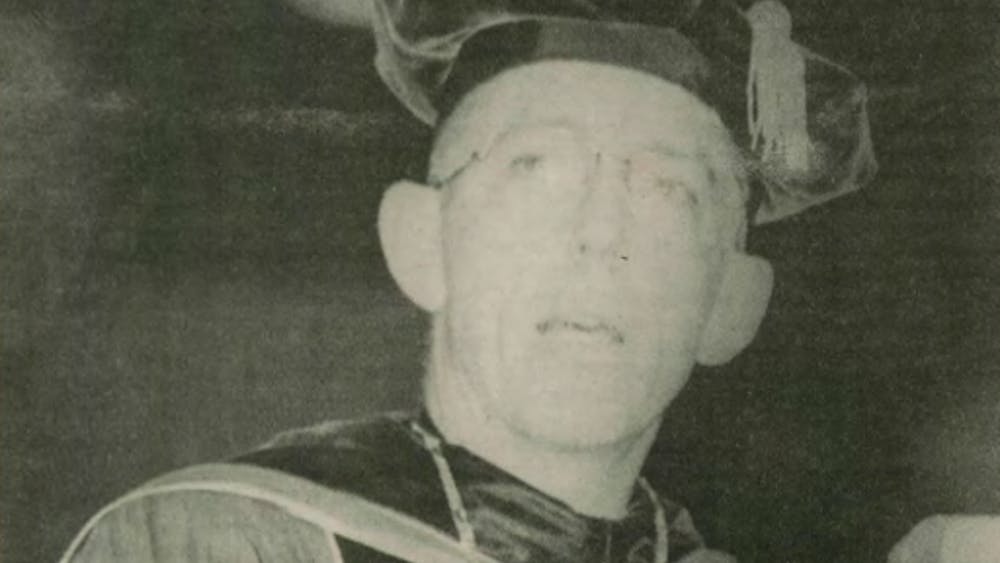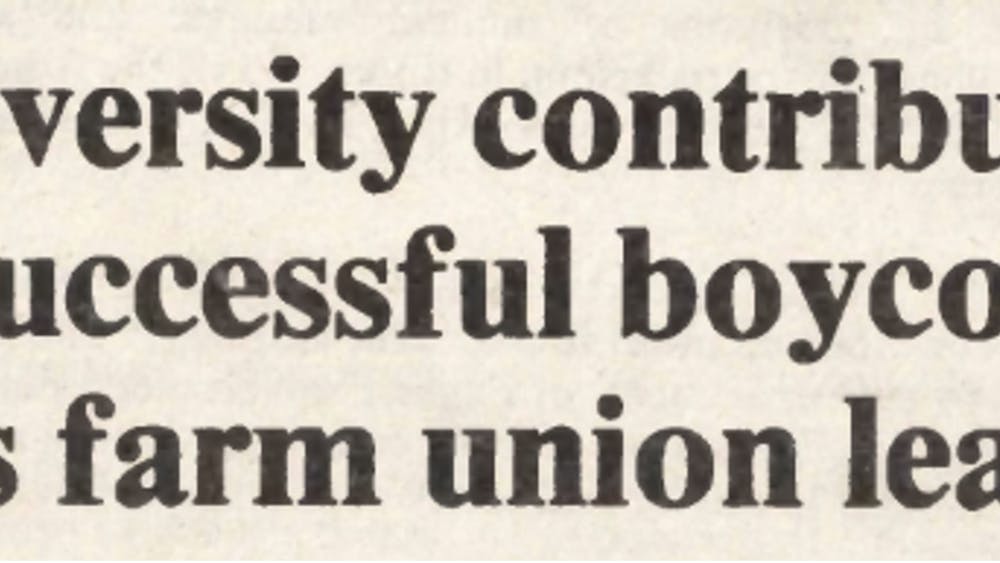
On this edition of “From the Archives” we delve into past campus crimes, stitching together a series of intriguing incidents that reveal a darker side to campus life. First, we encounter students who mysteriously receive letters from distant inmates. A night-time altercation involving a knife throws the tranquility of dorm life into question, spotlighting unexpected dangers in otherwise familiar spaces. The narrative concludes by exploring a baffling extortion case within the North Dining Hall, where the truth remains as elusive as it is compelling.
New Friends from Behind Bars?
Feb. 7, 1992 | Andy Runkle | Researched by Lilyann Gardner
Notre Dame students are known for their ability to foster friendships and build community. Smiling faces and passing pleasantries are exchanged around every corner of campus, and word of this kindness spread beyond campus in 1992 to unlikely ears.
In the early months of the new year, two female Notre Dame students received “penpal type” letters from inmates in the Indiana State Penitentiary in Michigan City and from a prison in New Jersey.
Neither student recognized the inmates or understood how they found their addresses, but assistant director of security Chuck Hurley assured members of the University that the content of the letters did not include anything obscene or threatening.
Nonetheless, the letter from the Indiana State Penitentiary included a mark on the envelope to “return to sender” that allowed the students to cease all communication. Hurley later contacted officials in Michigan City to investigate how the inmates received their information to prevent similar incidents from occurring in the future.
Despite the benign nature of the letters, they served as a reminder of the boundaries Notre Dame students preferred to maintain. While their hearts might be open to forming new friendships, they remained discerning about drawing the line — preferring the comfort of campus connections over correspondences from the penitentiary.
The Keenan-St. Ed’s Knife Incident of 2002
April 24, 2002 | Scott Brodfuehrer | April 25, 2002 | Scott Brodfuehrer | Researched by Cade Czarnecki
On April 20, 2002, at around 1:25 a.m., a St. Edward’s Hall resident was leaving his friends’ dorm room in Keenan Hall. He was headed out of the building to pick up a pizza he and his friends had ordered.
There are contrasting accounts of what happened next. Supposedly instigated by the removal of a basketball from the dorm room that the students were in that night, the alleged victim was stopped in the hallway by one of his friends’ roommates, the alleged suspect. The alleged suspect reportedly threw a football at the St. Edward’s resident and then proceeded to try to tackle him.
After a brief tussle, the alleged victim held the suspect at bay momentarily before the alleged suspect pulled out a butterfly knife and pointed it at the St. Edward’s resident. The alleged victim immediately backed off.
Once the event concluded, the alleged victim reported it to hall staff who consequently got Notre Dame police involved.
The Keenan resident recounted the events slightly differently, purporting the alleged victim had thrown the football at him first and then pinned him on the ground. Fearing for his health, he pulled out the knife to get the relatively larger Keenan Hall resident off of him.
In the wake of the alleged knife assault, Notre Dame Security/Police assistant director Charles Hurley said, “This type of conduct [violence] is not tolerated. Most of our students know this. This type of conduct is very rare.”
In the following days, the incident was recounted several times in varying fashions. Two facts remained consistent throughout: no alcohol was involved and a butterfly knife was brandished. The other details exist in a shroud of uncertainty.
Reflecting on the incident, the victim chose not to pursue legal recourse against the suspect. His decision hints at a broader trust in the safety of Notre Dame, aligning with assistant director Hurley’s belief that this unsettling event was an anomaly, not indicative of the campus’s usual tranquility.
Dining Hall Deception: The Unproven Notre Dame Extortion Case
March 9, 1984 | Jeff Harrington and Paul McGinn | March 16, 1984 | Paul McGinn | Researched by Thomas Dobbs
In November 1983, the Notre Dame community was shaken by allegations of extortion within North Dining Hall. Five employees, including three managers and two workers, were dismissed without notice, accused of involvement in a scheme to extort money from a fellow employee.
The accusation at the core of the North Dining Hall incident was stark: Ann Harris and Ada Peate were alleged to have harassed a co-worker, demanding money and gifts. They were also accused of embezzling $1,500 from the co-worker’s credit union account.
Yet, despite the severity of the charges, an investigation failed to “uncover concrete evidence against” the accused, raising questions about the justness of their termination.
As the University’s investigation unfolded, the complexities of the case emerged. Security investigator William Hedl stated, “We could not pin down … any crime,” a stark contrast to the claims that initially led to the firings. The evidence, including handwriting samples sent to the state police lab, failed to match the accused. Hedl admitted, “There was not enough to substantiate bringing charges.”
The fallout from the incident was palpable. The University, in its termination letters, made its stance clear. William Hickey, Jr., director of university food services, wrote in one letter to the dismissed managers, “We don’t believe you didn’t know (about the Harris case), and do believe you failed to raise the concern.”
Because of this lack of evidence, an appeals referee approved unemployment benefits for the fired workers, finding no “proven just cause, nor for gross misconduct.” The University’s procedures, or lack thereof, came under scrutiny as well, with the official employee relations handbook’s stipulated warnings and suspensions seemingly ignored.
The firings sparked a dialogue about the University’s governance and the actions of its leaders. The Observer editorialized on the administration’s silence, criticizing the perceived disconnect between public statements and actions. “Father knows best” syndrome was cited as a concern, with the paper expressing disillusionment in the leadership’s failure to engage with the issue.
The North Dining Hall incident might read like a far-fetched storyline, yet it serves as a real-world lesson in the importance of due process. It’s a stark reminder that even within the halls of academia, the truth can be as slippery as an overcooked noodle. As Notre Dame continues to refine its policies, this tale of alleged extortion remains a cautionary footnote, prompting a wry acknowledgment that sometimes, truth is stranger than fiction.










